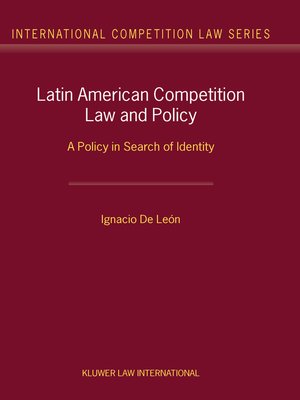Latin American Competition Law and Policy
ebook ∣ A Policy in Search of Identity · International Competition Law
By Ignacio De León

Sign up to save your library
With an OverDrive account, you can save your favorite libraries for at-a-glance information about availability. Find out more about OverDrive accounts.
Find this title in Libby, the library reading app by OverDrive.



Search for a digital library with this title
Title found at these libraries:
| Library Name | Distance |
|---|---|
| Loading... |
Thanks to the strategy of apertura that has characterized economic policy throughout Latin America since the debt crisis, foreign investment is on the rise and a significant degree of economic stability has been achieved. In the global arena, however, the enormous promise of Latin American trade remains only partially realized, as policy makers in the region struggle to design a fair level playing field for encouraging sustained and equitable development, through implementing transparent regulatory business environments across the region. Competition policy has accordingly become a major regulatory issue in both individual Latin American countries and in regional cooperation arrangements.
In considering the development of the "second generation" of regulatory policy initiatives implemented in the region, this important book analyzes the role of competition policy in the promotion of successful and sustained economic development. Examples of the vital and diverse aspects of the region's competition policy agenda covered are:
The author combines the legal description of the jurisdictions reviewed with the analytical tools of institutional economics, to give a fully rounded picture of this complex and evolving subject. As a result, Latin American Competition Law and Policy stands out as a fundamental resource for all world trade professionals at a time when Latin America's presence in the global economy is rapidly assuming greater dimensions.







